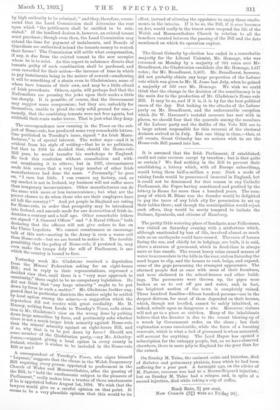" Layman," suggests that the erau e se in me t s h ' e Bill requiring •• equning
every person appointed wWheolshsigSnusspheinnisoserlfy to preferment in the Church of Wales and Monmouthshire, after the passing of the Bill, to "hold the akemoluments subject to the pleasure of Parliament," really m if he is appointed before Aguesuhn a trustee of these emoluments August l st , 1894. We wish that the lawyers would give us a careful opinion on that point. It seems to be a very plausible opinion that this would be its effect, instead of allowing the appointee to enjoy these emolu- ments in the interim. If it be so, the Bill, if it ever becomes an Act, would really in the truest sense suspend the life of the Welsh and Monmouthshire Church in relation to all the benefices vacated between the passing of the Bill and the date mentioned on which its operation expires.


































 Previous page
Previous page